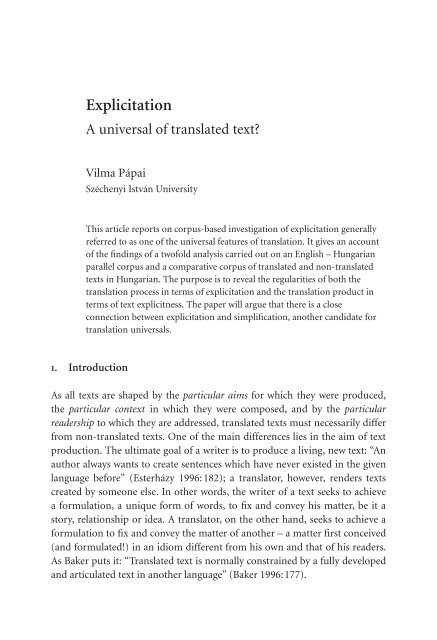Translation Universals.pdf - ymerleksi - home
Translation Universals.pdf - ymerleksi - home
Translation Universals.pdf - ymerleksi - home
You also want an ePaper? Increase the reach of your titles
YUMPU automatically turns print PDFs into web optimized ePapers that Google loves.
Explicitation<br />
A universal of translated text?<br />
Vilma Pápai<br />
Széchenyi István University<br />
This article reports on corpus-based investigation of explicitation generally<br />
referred to as one of the universal features of translation. It gives an account<br />
of the findings of a twofold analysis carried out on an English – Hungarian<br />
parallel corpus and a comparative corpus of translated and non-translated<br />
texts in Hungarian. The purpose is to reveal the regularities of both the<br />
translation process in terms of explicitation and the translation product in<br />
terms of text explicitness. The paper will argue that there is a close<br />
connection between explicitation and simplification, another candidate for<br />
translation universals.<br />
1. Introduction<br />
As all texts are shaped by the particular aims for which they were produced,<br />
the particular context in which they were composed, and by the particular<br />
readership to which they are addressed, translated texts must necessarily differ<br />
from non-translated texts. One of the main differences lies in the aim of text<br />
production. The ultimate goal of a writer is to produce a living, new text: “An<br />
author always wants to create sentences which have never existed in the given<br />
language before” (Esterházy 1996:182); a translator, however, renders texts<br />
created by someone else. In other words, the writer of a text seeks to achieve<br />
a formulation, a unique form of words, to fix and convey his matter, be it a<br />
story, relationship or idea. A translator, on the other hand, seeks to achieve a<br />
formulation to fix and convey the matter of another – a matter first conceived<br />
(and formulated!) in an idiom different from his own and that of his readers.<br />
As Baker puts it: “Translated text is normally constrained by a fully developed<br />
and articulated text in another language” (Baker 1996:177).
















